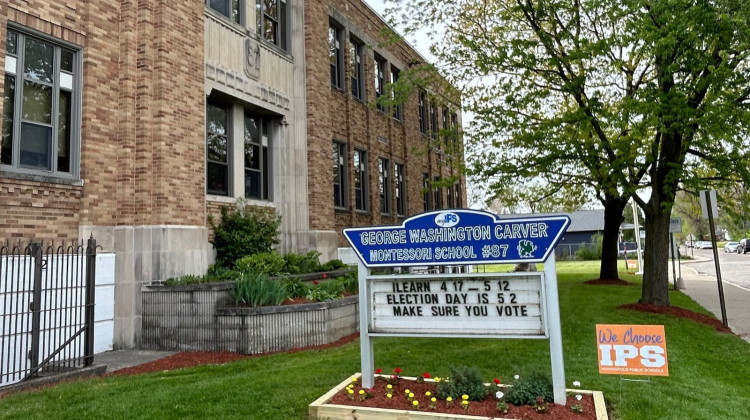
Indiana Secretary of Education Katie Jenner holds up a favorite childhood book at Eastside Elementary School in Anderson, where Lilly Endowment and state officials announced an investment in student literacy.
Eric Weddle/WFYIANDERSON – Gov. Eric Holcomb Thursday morning announced an $111 million investment in philanthropic and state funds to target Indiana’s sliding literacy rate for young readers through specialized teacher training and new supports for students struggling to master the critical skill.
Holcomb also set a goal for 95 percent of all Indiana’s third graders to pass the state’s elementary reading exam by 2027. Results this month found nearly 1 in 5 Indiana third graders lacked fundamental skills needed to become a successful reader prepared to learn.
“It couldn’t be a more timely response to the last couple years,” Holcomb said at an event to announce the investment at Eastside Elementary School in Anderson. “I am just so exhilarated, quite frankly, excited, to see from kindergarten to fourth grade the impact this is going to have over just the next five years.”
The Indianapolis-based Lilly Endowment foundation awarded a grant of up to $60 million to kickstart the far-reaching initiative. The Indiana Department of Education will use $26 million of its federal pandemic relief funds for these literacy efforts focused on students in kindergarten through third grades.
In addition, Lilly Endowment will provide $25 million toward helping teacher preparation programs at Indiana universities and colleges begin using or boost instruction on the foundations of reading science.
This the largest financial investment for student literacy in state history.
The injection of reading supports comes as Indiana faces complex academic challenges, including a blackslide in student literacy in the crucial third grade year, a consistent racial achievement gap between Black and Brown students compared to their White classmates, and a shrinking interest in students attending college after high school graduation.
A focus of the initiative is for educators to use the “science of reading” to teach literacy. This isn't a specific curriculum or program, but a body of research on children’s brain development, instruction, and best practices that provides educators with multiple strategies for teaching kids how to read.
Indiana Secretary of Education Katie Jenner said the public and private philanthropic investment presents an unprecedented opportunity for teachers to learn new teaching methods and reverse the decline in reading skills among third graders.
Results this year from the IREAD-3, the state’s third grade reading exam, showed a passage rate nearly 10 percentage points behind the top rate of 91.4 percent a decade ago.
A major part of the effort is a pledge to place instructional coaches trained in the science of reading in 600 schools across the state.
“We know with this training and support, our instructional coaches and teachers, we can get there for kids,” Jenner said of meeting the 95 percent pass rate goal.
Clay Robbins, Lilly Endowment chairman and CEO, said many factors affect reading achievement, but the foundation believes science of reading strategies can address equity gaps in literacy.
“Far too few of our third graders read efficiently to really be able to do well at school later on. It is critical that we can come up with ways to make sure they can. It is just imperative,” Robbins said. “This is particularly true in children of color and also low-income students.”
The initiative has four main goals:
- Support educators at local schools with instructional coaching in the science of reading. The IDOE is piloting instructional coaching at 54 schools this fall with staff from the University of Indianapolis’ Center of Excellence in Leadership of Learning (CELL). The new funding will expand this to about 60 percent of elementary schools by the summer of 2026 and will be overseen by CELL.
- Support students with the greatest difficulty learning to read. This includes students in special education, students of color, and students whose primary language is not English.
- Create a Science of Reading center at IDOE. Staff will be hired to assist local schools and through the Indiana Learning Lab.
- Stipends for teachers to learn the science of reading. IDOE will provide up to $1,200 to incentivize early elementary school teachers to opt in to the training.
Details on Lilly Endowment’s $25 million in grants to support Indiana’s higher education teacher preparation programs will be released soon, Robbins said.
Low reading scores
Students are expected to read with confidence in third grade, and then begin to further use critical thinking and understanding of literature through high-quality reading skills.
But multiple standardized tests show Indiana students are falling behind in foundational reading skills, such as building a vocabulary and grasping phonics –how letters represent sounds.
The ILEARN test measures four levels of reading proficiency – below, approaching, at level, above level – based on students’ understanding and interpretation of what is gained from texts.
This year, 38 percent of third and fourth grade students were in the lowest reading benchmark, below proficiency, meaning they require significant support to knowledge, application of reading, and analytical thinking.
For all students in third through eighth grades taking the exam, nearly 60 percent were not reading at grade level.
These and other assessments also show student populations, including Black and Hispanic students, students with disabilities, and English language learners, are even further behind their White classmates as they try to catch up from disruptions caused by the pandemic.
Pre-pandemic results from the federally administered National Assessment of Educational Progress test, or NAPE, showed only 17 percent of Black students, 24 percent of Hispanic students and 24 percent of students from low-income households scored proficient or better.
In April, the Indiana State Conference of the NAACP released a plan to address the academic achievement gaps between Black students and their White classmates. They've called on Holcomb and the IDOE to adopt it.
After Thursday’s event, Holcomb said he has not yet reviewed the plan in detail.
“But I will say this: It is not the only new plan and new thoughts,” he said. “And all of these should funnel into where we arrive in January when we launch our new budget.”
Lawmakers will reconvene in January for the 2023 legislative session, when the state’s next two-year budget will be developed.
Contact WFYI education editor Eric Weddle at eweddle@wfyi.org or call (317) 614-0470. Follow on Twitter: @ericweddle.
 DONATE
DONATE






 Support WFYI. We can't do it without you.
Support WFYI. We can't do it without you.